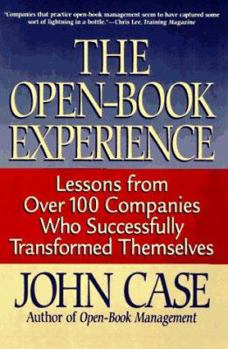The Open-Book Experience: Lessons from Over 100 Companies Who Successfully Transformed Themselves
Select Format
Select Condition 
Book Overview
Over the last decade companies have struggled to balance the human dimension of business with the need to be aggressive, competitive, and profitable. Of all the management solutions considered, one... This description may be from another edition of this product.
Format:Hardcover
Language:English
ISBN:0201933497
ISBN13:9780201933499
Release Date:November 1997
Publisher:Addison Wesley Publishing Company
Length:237 Pages
Weight:1.10 lbs.
Dimensions:0.9" x 6.3" x 9.5"
Customer Reviews
5 ratings
The next step for Open-Book Management
Published by Thriftbooks.com User , 20 years ago
In his first book on Open-Book Management (OBM), the author builds the case for why a change in management practice is necessary, and why OBM in particular uniquely best addresses the issues needed for successful management today. Once one has read that book and is either interested enough to want to learn more or sold to the point he or she wants to implement it, then this book is the perfect follow-up.This book focuses on the details, and they say the devil is always in the details. You could say the authors first book dealt more with the "WHY" and this deals more with the "HOW", though there is some crossover. By drawing experiences (both good and bad) from 100 companies, the reader can benefit enormously by not having to deal with as much trial-and-error personally. I highly recommend this book to those who are likely to implement OBM.
"A New Way of Thinking": Macro and Micro Perspectives
Published by Thriftbooks.com User , 22 years ago
I recently re-read Case's Open-Book Management: The Coming Business Revolution (1996) and then this book (1999). Both are even more important now than when originally published. In this volume, Case develops his key ideas in much greater depth while examining more than 100 companies which -- to varying extent -- have implemented open-book principles. Perhaps without intending to, some reviewers have incorrectly suggested that these principles have relevance only to publicly-traded companies. In fact, I think they can also be of substantial value to non-profits as well as to privately-owned companies. Consider the over-used phrase "taking ownership" in the context of assuming responsibility for helping to reduce costs by completing more and better work in less time or in the context of assuming responsibility for making certain that a customer's problem has been solved. Heaven knows, what Case advocates will increase "business literacy" among everyone involved in a given enterprise but it can and should accomplish more, much more. For example, effective application of open-book principles will create a "transparent" organization. That is, one in which everyone is kept fully informed of what is most important to the success of that enterprise. Such knowledge includes but is by no means is limited to financial information which explains, for example, how much it costs to open the door each business day or how much money is spent on training, overtime, postage, shipping, etc. According to Case, "Really the only way for a company to boost performance consistently over the long terms is to have employees who work enthusiastically and effectively and who take responsibility for their own work. Good systems -- meaning good procedures and equipment -- are indispensable. But what makes the difference in the end is whether the employees doing the job think about doing it just a little bit better and care whether they do or don't." At a time when competition is more ferocious than ever before, "battles" will be won or lost within what Case characterizes as "the human dimension of business -- the wanting, the caring, the enthusiasm, the problem solving and initiative taking." Open-book principles offer a new approach to management, one which starts from scratch with a new set of assumptions "about how people in an organization work together." In this volume, citing countless real-world applications of those principles, Case explains HOW...and, of equal importance, WHY.If possible, read Open-Book Management first. You may also wish to check out Kaplan and Norton's The Balanced Scorecard: Translating Strategy into Action and then its sequel, The Strategy-Focused Organization: How Balanced Scorecard Companies Thrive in the New Business Environment. Perhaps the Lone Ranger could prevail armed only with a silver bullet but the rest of us need a full arsenal of weapons. Many of them are provided by Case, Kaplan, and Norton.
A must read book for any interested in Open-book Management
Published by Thriftbooks.com User , 24 years ago
One of the best books yet on Open Book Management. Full of practical advice for anyone trying to use Open Book Management in their business. As anyone involved in implementing OBM will tell you, you need all the help you can get. This book has given us a host of new ideas and lots of hands on stuff to help us to make OBM a reality in our business. We hope the next book isn't far away.
OPENING YOUR ORGANIZATION TO THE OPEN-BOOK PHILOSOPHY.
Published by Thriftbooks.com User , 25 years ago
Opening and reading this book is extremely worthwhile. It is a practical guide showing how to IMPLEMENT the open-book philosophy. This work provides a new model of business management that bridges the people- versus profit-orientation approaches. Discusses and presents features of ten open-book bonus plans. Some key topics are participation, communication, and empowerment. Filled with lots of detailed information and insights. Reviewed by Gerry Stern, founder, Stern & Associates, author of Stern's Sourcefinder: The Master Directory to HR and Business Management Information & Resources, Stern's CyberSpace SourceFinder, and Stern's Compensation and Benefits SourceFinder.
Excellent insight in to the practical side of OBM
Published by Thriftbooks.com User , 25 years ago
Great practical information on actual open book practices from several companies.




